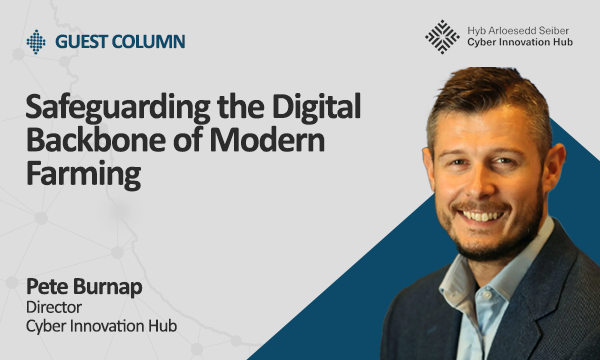The announcement of a CCR-based Cyber Innovation Hub in May this year opened up a new horizon for the digital economy, talent base, and security of our Region.
This world-first innovation hub is being led by Cardiff University, with partners including Airbus, Alacrity Cyber, CGI, Thales NDEC, Tramshed Tech, and the University of South Wales – bringing together industry, government and economic partners in a coordinated approach to skills, innovation and new enterprise creation, with the mission to transform Cardiff Capital Region into one of the world’s leading cyber clusters by 2030.
By the end of this decade, the Hub aims to have grown the cyber security sector in Wales by more than 50% – creating more than 25 high-growth companies, attracting £20m+ in private equity investments, and training more than 1,500 cyber-skilled individuals to fulfil the ever-growing potential of this incredible new ecosystem.
The journey is already underway to achieve these region-defining ambitions – with today seeing the launch of https://cyberinnovationhub.wales to coincide with ‘Cyber Monday’ – and we spoke with Pete Burnap, key driver of the Hub and Professor of Data Science and Cybersecurity at Cardiff University, on the journey so far, and the progress being made towards a ‘hard launch’ of the Hub in the spring of 2023 …
A revolution building a foundation
“The last year or so has already seen something of a revolution in the cyber capabilities and practices of our region – paving the way for much more to come in 2023.
“The move of our School of Computer Science & Informatics into the Abacws building was a total game changer in itself, giving us loads of natural light and lots of space for collaboration – and a network of PCs running off the main network, which allows us to do things in malware analysis, reverse engineering and penetration testing that we couldn’t do before. This transformation on its own has been a major step change – proving brilliant for hands-on teaching and providing a truly immersive learning experience for our students.
“The new Cyber Attack & Defence lab really brings cyber to life, with a £1.2m investment in kit giving us a mini-manufacturing production line and mini smart city – think of them as connected digital twins – that enable us to virtualise networks, watch a ransomware attack happen in real-time, and learn how to deal with it.
“Having a virtualized computer network at scale means our students can get to grips with, for example, a cyber attack on a hospital – all in real time – and this new capability has allowed us to produce research outcomes that show the rest of the world how to deal with a cyber attack in any number of novel ways. None of this would be possible without the new infrastructure and investment, and it gives us a glimpse of our potential when the Hub is fully launched in 2023.
“By then, the whole foundation of the Hub will be in place, with all moving parts working together, but even in the past few months we have been making major strides.
Refining plans, engaging with enterprises, building momentum …
“The summer and autumn has seen many of the hard yards being covered, with the signing of the Grant Offer Letter between CCR, Welsh Government and Cardiff University, Matthew Turner joining us as Head of Operations, recruitment for other roles well underway – and plans finalised for the Hub operational team and additional testbeds to move into Sparc.
“During that time we’ve been working closely with industry partners Airbus, CGI and Thales, and building new relationships with additional stakeholders, to refine our strategic plans – bringing ongoing dialogue in critical areas such as building cyber talent pipelines, the impact of regulations and the potential application of innovation technologies – as well as talking to companies across the region to assess industry demand for disruptive cyber solutions, which has been invaluable in identifying market trends, understanding customer needs, developing value propositions and shaping possible routes to market.
“Throughout all of this I’m delighted to say that we’ve also been supporting a number of innovative projects being run by graduate entrepreneurs, as well as helping support three new cyber start-ups to become part of our ecosystem, so the momentum is really starting to build ahead of hard launch next year.
Collaboration key to creating a world-first
“The agility and appetite for collaboration shown by all stakeholders in our region never ceases to amaze me, and they’re two of the reasons why we knew we had what it takes to become a leading cyber cluster. That was proven to me last year – when within a few short months, a conversation with PwC had evolved to become a full Cyber Security and Technology MSc offering uniquely deep technical learning, producing work-ready masters-level people for PwC and every other company to employ in the Region. The minute we had worked out the proposition for a brand new Masters programme, CCR backed it to the full – showing the boldness and ambition we need to display every day, if we’re to grab what really is a moment in time to create something very special, here in South East Wales.
“The launch of the Cyber Innovation Hub has cemented and built on all of that collaboration and agility, and hugely so. Getting that world-standard cyber capability for our Region unlocks all the potential we have to establish a leading cyber cluster – which in turn enables and empowers every sector in our economy to become the best it can be.
“The possibilities are almost endless. We will have the capacity and capability to take companies in sectors such as the automotive and manufacturing sectors up to a whole new level. Those enterprises are moving towards smart technologies and processes, which open them up to amazing new possibilities – but also cyber attacks as well. We can protect and enable them at the same time, bringing a real multiplier effect to the whole of our economy – across high value fast growing sectors that include financial services and professional services, which are proven to deliver prosperity to the Region.
Growing the skills and nurturing the talent
“The timing of the Hub couldn’t be better from a skills perspective, either. Cardiff Met, Cardiff University and University of South Wales all have National Cyber Security Centre accredited courses at graduate or postgraduate level – and our FE and schools are doing outstandingly well with their Cyber First programmes.
“The Hub can reinforce that – and fill in the gaps, too, in terms of upskilling and reskilling our current workforce, through short learning bursts and training sprints that are tailored to different sectors. That will really push us ahead, both nationally and internationally – widening the funnel to bring in many new people from all backgrounds and communities.
“That’s one of the reasons why the immersive learning experience is so important. It really does bring the whole cyber subject to life – turning on the cyber light bulb for someone working in another industry, or a pupil in Year 9, so they think ‘I can do that’.
“There are so many different routes into a career in Cyber. Yes, there’s the academic avenue – but also a much more vocational pathway for people who have ‘natural’ practical and problem-solving skills. There are many communities in our region who have those engineering-oriented skills, so again, we have enormous potential to become the catalyst for major employment opportunities, right across South East Wales.
“It’s about opening eyes, and winning hearts and minds, so it’s good to report that today sees the launch of our website, https://cyberinnovationhub.wales – a portal that will be growing considerably in the next few months, as we get more and more people involved in our mission.
“We have started the journey – and the best is yet to come, as we supply the skills to support a leading Cyber Security cluster, as well as other priority clusters like FinTech and MedTech that are at the heart of growing a futureproofed and high-performing economy.”
With CCR contributing £3 million to the £9.5 million investment, matched by £3m of Welsh Government funding to help bring alive the Cyber Innovation Hub, we’ll be running a series of short videos over the next few weeks, spotlighting further insights from Professor Pete – and highlighting how people can become involved with a unique phenomenon that promises to be such an important catalyst for our economic growth, and a critical part of our national cyber security.






